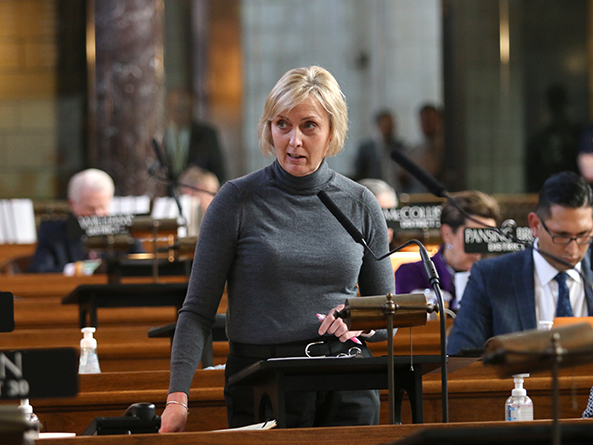Municipal omnibus bill clears first round
A bill to give certain Nebraska towns more flexibility in responding to catastrophic flooding was amended to become an omnibus municipal bill and advanced from general file March 11.

LB1003, introduced by Sen. Lynne Walz of Fremont, would allow any second class city or village to annex land, lots, tracts, streets or highways to relocate all or part of a town because of catastrophic flooding, while waiving a requirement that annexed areas be contiguous or adjacent and urban or suburban in character.
The bill would require a two-thirds vote of either a city council or the village board to annex land.
Walz said she introduced LB1003 after the city of Winslow was devastated by last year’s flood. The town would like to move from the flood plain but cannot do so under rules established by the Federal Emergency Management Agency, she said, and Winslow faces an uncertain future if it cannot move.
“This is a very specific set of circumstances that we’re adjusting state statute for,” Walz said.
An Urban Affairs Committee amendment, adopted 36-0, would add a definition of catastrophic flooding and an emergency clause to make the bill effective immediately upon passage. It also would add the provisions of eight other bills:
• LB795, introduced by Lincoln Sen. Matt Hansen, which would amend the Enterprise Zone Act to define unemployment criteria;
• LB799, introduced by the Urban Affairs Committee, which would make technical changes to statutes covering primary class cities;
• LB801, also introduced by the committee, which would make technical changes the Community Development Law related to tax-increment financing;
• LB821, introduced by Sen. Tom Brewer of Gordon, which would allow the planning commission of a first or second class city or village to cancel a quarterly meeting if there is no business pending;
• LB885, introduced by Lincoln Sen. Kate Bolz, which would change requirements for grants under the Civic and Community Center Financing Act;
• LB957, also introduced by Walz, which would allow a mayor of a first or second class city to be considered a member of the town’s city council to establish a quorum if the council consists of four members;
• LB984, introduced by Omaha Sen. Megan Hunt, which would require vacancies on airport authority, metropolitan transit authority, land bank, riverfront development authority and housing authority boards to be filled within six month after the date of the vacancy; and
• LB993, introduced by Kearney Sen. John Lowe, which would allow cities with a population between 10,000 and 25,000 to expand the size of their city council from five to seven members under the City Manager Plan of Government Act.
Following adoption of the committee amendment, lawmakers advanced LB1003 to select file on a 35-0 vote.


